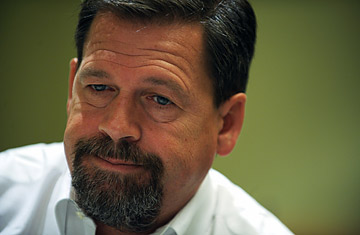
Mark Salter, top advisor to Republican presidential nominee Arizona Senator John McCain
TIME spoke with John McCain's biographer and closest aide, Mark Salter, the morning after the election. Sitting in the courtyard of Phoenix's Biltmore Resort, Salter reflected on the campaign.
Last night McCain's mood was...
Relaxed. There were some people who were sad, but there was kind of a party-like atmosphere. Phil Gramm says, 'You know what's interesting about McCain is that he has no malice.' He really doesn't. He will get mad at people in certain situations. But you know, he's served the people of this country for fifty years, he's not going to gainsay the results. He fought as hard as he could.
What is the one moment from the campaign that you'll always remember?
I think it was the weekend after the campaign kind of fell apart, when John Weaver left and Terry [Nelson] left. Emotions were raw. He was obviously not happy with the way things had gone. He went up to New Hampshire to keep it moving, to give a speech. It was the famous flight where he and Jimmy [McCain, his youngest son] and I were on Southwest Airlines, carrying our own bags. Some cable [channel] got it. Jimmy was three weeks out from shipping out overseas. We get through the speech, and you have pretty much the senior class of the Washington press corps all lined up. You know they all came to see if he was going to drop dead. He didn't bitch, he didn't moan. There were no recriminations. There was nothing except a mental and emotional confidence--this is what I set out to do, and I will do this, and if I fail I fail, but no one will tell me I failed until I have. That must be kind of a glimpse of a kind of emotional toughness that got him through Vietnam. He is just way above average.
If things had gone differently, if the financial crisis hadn't happened, do you think this would have been a different kind of race?
I think if we hadn't had the collapse of the global credit market, yeah, I think we might have been able to fight our way through it. I was just looking at the popular vote. It's 53% to 46%. We were probably three or four points on top of him before Lehman Brothers went down. You had a country that was fed up with the Bush Administration, horrible wrong-track numbers, and an opponent with $700 million. We had $85 [million]. And we got 56 million votes. That's not too bad in this environment. All the really, really red states that everybody thought we might lose—except for Indiana, I guess—Montana, North Dakota, they all held. I think the [Republican] brand held up given the assault on it. This sort of Maureen Dowd nonsense, comic-book book theorizing about the Bushies who hijacked McCain--she can never write a serious column. It's just nonsense. It's just nonsense. Everybody, everybody felt a personal responsibility to protect McCain's reputation. The fact that we didn't do the back-of-the-bus stuff is only a function that you guys really wouldn't let us. Once the cameras demanded to be there, it became, What can McCain say that we can circulate on the hour and embarrass the shit out of him? So he just couldn't do it, and it wasn't a Bush hijacking or anything, it was recognizing reality. We were being mocked by the meta-narrative writers for being undisciplined, lacking a single central message.
Are you disappointed that you couldn't run the general election more like New Hampshire?
I don't think anybody can. I think if we had gotten ten town halls out of Obama, it would have come close to that. McCain's ideal would have been flying around on an airplane with Barack Obama, debating in town halls and having dinner with him afterwards. That would have been his ideal for the general election, but we can't write the rules ourselves. This is the way they are. You guys enforce them. And Obama played by them masterfully, absolutely masterfully. A disciplined, focused campaign.
